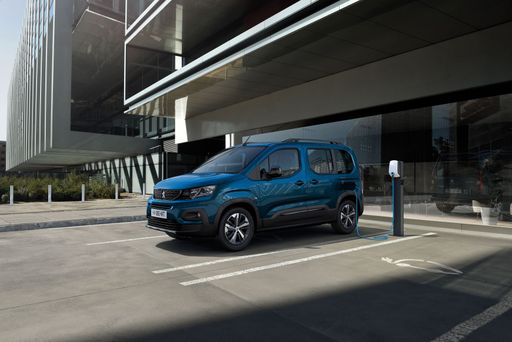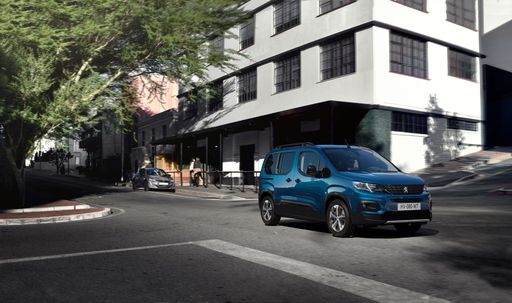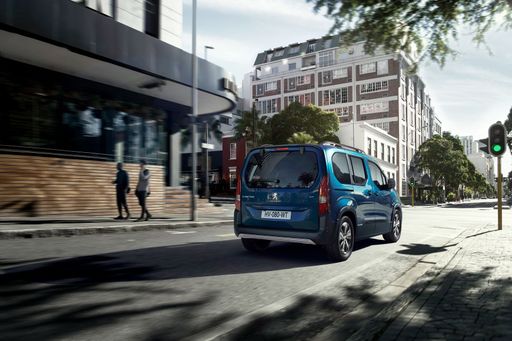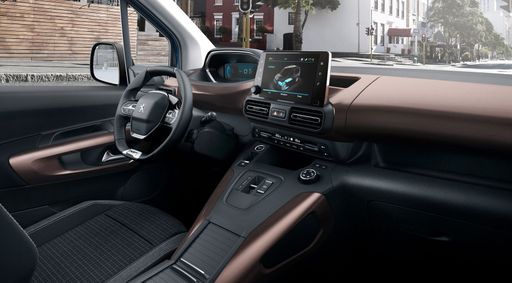Peugeot Rifter vs VW Transporter Transporter - Differences and prices compared
Compare performance (136 HP vs 286 HP), boot space and price (23800 £ vs 37500 £ ) at a glance. Find out which car is the better choice for you – Peugeot Rifter or VW Transporter Transporter?
Costs and Efficiency:
When it comes to price and running costs, the biggest differences usually appear. This is often where you see which car fits your budget better in the long run.
Peugeot Rifter has a significantly advantage in terms of price – it starts at 23800 £ , while the VW Transporter Transporter costs 37500 £ . That’s a price difference of around 13695 £.
Fuel consumption also shows a difference: Peugeot Rifter manages with 5.60 L and is therefore clearly perceptible more efficient than the VW Transporter Transporter with 7.10 L. The difference is about 1.50 L per 100 km.
In terms of energy consumption, the advantage goes to the Peugeot Rifter: with 18.30 kWh per 100 km, it’s to a small extent more efficient than the VW Transporter Transporter with 21.90 kWh. That’s a difference of about 3.60 kWh.
As for electric range, the Peugeot Rifter performs minimal better – achieving up to 339 km, about 8 km more than the VW Transporter Transporter.
Engine and Performance:
Under the bonnet, it becomes clear which model is tuned for sportiness and which one takes the lead when you hit the accelerator.
When it comes to engine power, the VW Transporter Transporter has a clearly edge – offering 286 HP compared to 136 HP. That’s roughly 150 HP more horsepower.
In acceleration from 0 to 100 km/h, the VW Transporter Transporter is decisively quicker – completing the sprint in 7.40 s, while the Peugeot Rifter takes 10.80 s. That’s about 3.40 s faster.
In terms of top speed, the Peugeot Rifter performs to a small extent better – reaching 184 km/h, while the VW Transporter Transporter tops out at 150 km/h. The difference is around 34 km/h.
There’s also a difference in torque: VW Transporter Transporter pulls noticeable stronger with 415 Nm compared to 300 Nm. That’s about 115 Nm difference.
Space and Everyday Use:
Whether family car or daily driver – which one offers more room, flexibility and comfort?
Seats: Peugeot Rifter offers distinct more seating capacity – 7 vs 5.
In curb weight, Peugeot Rifter is slightly lighter – 1561 kg compared to 1872 kg. The difference is around 311 kg.
When it comes to payload, VW Transporter Transporter clearly perceptible takes the win – 1259 kg compared to 814 kg. That’s a difference of about 445 kg.
Who wins the race in the data check?
The VW Transporter Transporter is decisively ahead in the objective data comparison.
This result only shows which model scores more points on paper – not which of the two cars feels right for you.
Costs and Consumption
View detailed analysis
Engine and Performance
View detailed analysis
Dimensions and Body
View detailed analysis

VW Transporter Transporter
Peugeot Rifter
The Peugeot Rifter is a practical, family-friendly people carrier that makes everyday errands and weekend escapes feel effortless thanks to its airy cabin and clever, flexible interior. With chunky, purposeful styling and storage solutions everywhere, the Rifter manages to be both unashamedly useful and unexpectedly likeable.
details



VW Transporter Transporter
The VW Transporter is the workhorse of the modern tradesman, blending practical cleverness with a cabin that's actually pleasant to spend a long day in. It may not steal the style spotlight, but its unshowy durability, clever load solutions and easy-to-live-with character make it a sensible pick for businesses and weekend projects alike.
detailsCosts and Consumption |
|
|---|---|
|
Price
23800 - 36600 £
|
Price
37500 - 60800 £
|
|
Consumption L/100km
5.6 - 6 L
|
Consumption L/100km
7.1 - 8.4 L
|
|
Consumption kWh/100km
18.3 - 19.1 kWh
|
Consumption kWh/100km
21.9 - 24.4 kWh
|
|
Electric Range
328 - 339 km
|
Electric Range
56 - 331 km
|
|
Battery Capacity
-
|
Battery Capacity
11.8 - 63.8 kWh
|
|
co2
0 - 158 g/km
|
co2
0 - 220 g/km
|
|
Fuel tank capacity
50 L
|
Fuel tank capacity
55 L
|
Dimensions and Body |
|
|---|---|
|
Body Type
High Roof Estate
|
Body Type
Cargo Van
|
|
Seats
5 - 7
|
Seats
2 - 5
|
|
Doors
4 - 5
|
Doors
4 - 5
|
|
Curb weight
1561 - 1941 kg
|
Curb weight
1872 - 2462 kg
|
|
Trunk capacity
322 - 1050 L
|
Trunk capacity
-
|
|
Length
4405 - 4755 mm
|
Length
5050 - 5450 mm
|
|
Width
1848 mm
|
Width
2032 mm
|
|
Height
1818 - 1837 mm
|
Height
1966 - 1985 mm
|
|
Max trunk capacity
3000 - 3500 L
|
Max trunk capacity
-
|
|
Payload
489 - 814 kg
|
Payload
755 - 1259 kg
|
Engine and Performance |
|
|---|---|
|
Engine Type
Electric, Diesel
|
Engine Type
Diesel, Plugin Hybrid, Electric
|
|
Transmission
Automatic, Manuel
|
Transmission
Manuel, Automatic
|
|
Transmission Detail
Reduction Gearbox, Manual Gearbox, Automatic Gearbox
|
Transmission Detail
Manual Gearbox, Automatic Gearbox
|
|
Drive Type
Front-Wheel Drive
|
Drive Type
Front-Wheel Drive, All-Wheel Drive, Rear-Wheel Drive
|
|
Power HP
102 - 136 HP
|
Power HP
110 - 286 HP
|
|
Acceleration 0-100km/h
10.8 - 13.6 s
|
Acceleration 0-100km/h
7.4 - 16.9 s
|
|
Max Speed
132 - 184 km/h
|
Max Speed
112 - 150 km/h
|
|
Torque
250 - 300 Nm
|
Torque
310 - 415 Nm
|
|
Number of Cylinders
4
|
Number of Cylinders
4
|
|
Power kW
75 - 100 kW
|
Power kW
81 - 210 kW
|
|
Engine capacity
1499 cm3
|
Engine capacity
1996 - 2488 cm3
|
General |
|
|---|---|
|
Model Year
2024
|
Model Year
2025
|
|
CO2 Efficiency Class
A, E, F
|
CO2 Efficiency Class
G, A
|
|
Brand
Peugeot
|
Brand
VW
|
What drivetrain options does the Peugeot Rifter have?
The Peugeot Rifter is offered with Front-Wheel Drive.
